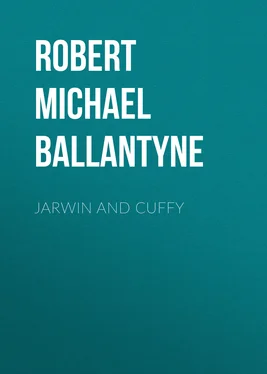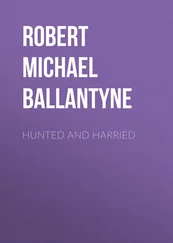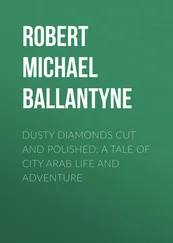Robert Michael Ballantyne - Jarwin and Cuffy
Здесь есть возможность читать онлайн «Robert Michael Ballantyne - Jarwin and Cuffy» — ознакомительный отрывок электронной книги совершенно бесплатно, а после прочтения отрывка купить полную версию. В некоторых случаях можно слушать аудио, скачать через торрент в формате fb2 и присутствует краткое содержание. Жанр: Детские приключения, literature_19, foreign_antique, foreign_prose, foreign_children, на английском языке. Описание произведения, (предисловие) а так же отзывы посетителей доступны на портале библиотеки ЛибКат.
- Название:Jarwin and Cuffy
- Автор:
- Жанр:
- Год:неизвестен
- ISBN:нет данных
- Рейтинг книги:3 / 5. Голосов: 1
-
Избранное:Добавить в избранное
- Отзывы:
-
Ваша оценка:
- 60
- 1
- 2
- 3
- 4
- 5
Jarwin and Cuffy: краткое содержание, описание и аннотация
Предлагаем к чтению аннотацию, описание, краткое содержание или предисловие (зависит от того, что написал сам автор книги «Jarwin and Cuffy»). Если вы не нашли необходимую информацию о книге — напишите в комментариях, мы постараемся отыскать её.
Jarwin and Cuffy — читать онлайн ознакомительный отрывок
Ниже представлен текст книги, разбитый по страницам. Система сохранения места последней прочитанной страницы, позволяет с удобством читать онлайн бесплатно книгу «Jarwin and Cuffy», без необходимости каждый раз заново искать на чём Вы остановились. Поставьте закладку, и сможете в любой момент перейти на страницу, на которой закончили чтение.
Интервал:
Закладка:
R. M. Ballantyne
Jarwin and Cuffy
Chapter One.
Adrift on the Ocean
On a certain morning, not very long ago, the sun, according to his ancient and admirable custom, rose at a very early hour, and casting his bright beams far and wide over the Pacific, lighted up the yellow sands and the verdant hills of one of the loveliest of the islands of that mighty sea.
It was early morning, as we have said, and there was plenty of life—animal as well as vegetable—to be seen on land and sea, and in the warm, hazy atmosphere. But there were no indications of man’s presence in that beautiful scene. The air was perfectly calm, yet the gentle swell of the ocean terminated in great waves, which came rolling in like walls of glass, and fell on the coral-reef like rushing snow-wreaths with a roar as loud as thunder.
Thousands of sea-birds screamed and circled in the sky. Fish leaped high out of their native element into the air, as if they wished to catch the gulls, while the gulls, seemingly smitten with a similar desire, dived into the water as if they wished to catch the fish. It might have been observed, however, that while the fish never succeeded in catching the gulls, the latter very frequently caught the fish, and, without taking the trouble to kill them, bolted them down alive.
Cocoanut-palms cast the shadows of their long stems and graceful tops upon the beach, while, farther inland, a dense forest of tropical plants—bread-fruit trees, bananas, etcetera—rose up the mountain-sides. Here and there open patches might be seen, that looked like fields and lawns, but there were no cottages or villas. Droves of pigs rambled about the valleys and on the hill-sides, but they were wild pigs. No man tended them. The bread-fruits, the cocoanuts, the bananas, the plantains, the plums, all were beautiful and fit for food, but no man owned them or used them, for, like many other spots in that sea of coral isles and savage men, the island was uninhabited.
In all the wide expanse of ocean that surrounded that island, there was nothing visible save one small, solitary speck on the far-off horizon. It might have been mistaken for a seagull, but it was in reality a raft—a mass of spars and planks rudely bound together with ropes. A boat’s mast rose from the centre of it, on which hung a rag of sail, and a small red flag drooped motionless from its summit. There were a few casks on the highest part of the raft, but no living soul was visible. Nevertheless, it was not without tenants. In a hollow between two of the spars, under the shadow of one of the casks, lay the form of a man. The canvas trousers, cotton shirt, blue jacket, and open necktie, bespoke him a sailor, but it seemed as though there were nothing left save the dead body of the unfortunate tar, so pale and thin and ghastly were his features. A terrier dog lay beside him, so shrunken that it looked like a mere scrap of door-matting. Both man and dog were apparently dead, but they were not so in reality, for, after lying about an hour quite motionless, the man slowly opened his eyes.
Ah, reader, it would have touched your heart to have seen those eyes! They were so deep set, as if in dark caverns, and so unnaturally large. They gazed round in a vacant way for a few moments, until they fell on the dog. Then a gleam of fire shot through them, and their owner raised his large, gaunt, wasted frame on one elbow, while he gazed with a look of eagerness, which was perfectly awful, at his dumb companion.
“Not dead yet !” he said, drawing a long sigh.
There was a strange, incongruous mixture of satisfaction and discontent in the remark, which was muttered in a faint whisper.
Another gleam shot through the large eyes. It was not a pleasant look. Slowly, and as if with difficulty, the man drew a clasp-knife from his pocket, and opened it. As he did so, his brows lowered and his teeth became clenched. It was quite plain what he meant to do. As he held the open knife over the dog’s head, he muttered, “Am I to die for the sake of a dog !”
Either the terrier’s slumbers had come to an end naturally, at a fortunate moment, or the master’s voice had awakened it, for it opened its eyes, raised its head, and looked up in the sailor’s face. The hand with the knife drooped a little. The dog rose and licked it. Hunger had done its work on the poor creature, for it could hardly stand, yet it managed to look in its master’s face with that grave, simple gaze of self-forgetting love, which appears to be peculiar to the canine race. The savage glare of the seaman’s eyes vanished. He dropped the knife.
“Thanks, Cuffy; thanks for stoppin’ me. It would have been murder ! No, no, my doggie, you and I shall die together.”
His voice sank into a murmur, partly from weakness and partly from the ideas suggested by his concluding words.
“Die together!” he repeated, “surely it ain’t come to that yet . Wot, John Jarwin, you’re not goin’ to give in like that, are you? to haul down your colours on a fine day with a clear sky like this overhead? Come, cheer up, lad; you’re young and can hold out a good while yet. Hey, old dog, wot say you ?”
The dog made a motion that would, in ordinary circumstances, have resulted in the wagging of its tail, but the tail was powerless to respond.
At that moment a gull flew towards the raft; Jarwin watched it eagerly as it approached. “Ah,” he muttered, clasping his bony hand as tightly over his heart as his strength would allow and addressing the gull, “if I only had hold of you , I’d tear you limb from limb, and drink your blood!”
He watched the bird intently as it flew straight over him. Leaning back, he continued slowly to follow its flight, until his head rested on the block of wood which had served him for a pillow. The support felt agreeable, he forgot the gull, closed his eyes, and sank with a deep sigh into a slumber that strongly resembled death.
Presently he awoke with a start, and, once more raising himself, gazed round upon the sea. No ship was to be seen. How often he had gazed round the watery circle with the same anxious look only to meet with disappointment! The hills of the coral island were visible like a blue cloud on the horizon, but Jarwin’s eyes were too dim and worn out to observe them.
“Come,” he exclaimed, suddenly, scrambling to his feet, “rouse up, Cuffy; you an’ I ain’t a-goin’ to die without a good fight for life. Come along, my hearty; we’ll have another glass of grog—Adam’s grog it is, but it has been good grog to you an’ me, doggie—an’ then we shall have another inspection o’ the locker; mayhap there’s the half of a crumb left.”
The comparatively cheery tone in which the sailor said this seemed to invigorate the dog, for it rose and actually succeeded in wriggling its tail as it staggered after its master—indubitable sign of hope and love not yet subdued!
Jarwin went to a cask which still contained a small quantity of fresh water. Three weeks before the point at which we take up his story, a storm had left him and his dog the sole survivors on the raft of the crew of a barque which had sprung a leak, and gone to the bottom. His provision at the time was a very small quantity of biscuit and a cask of fresh water. Several days before this the last biscuit had been consumed but the water had not yet failed. Hitherto John Jarwin had husbanded his provisions, but now, feeling desperate, he drank deeply of the few remaining drops of that liquid which, at the time, was almost as vital to him as his life-blood. He gave a full draught also to the little dog.
“Share and share alike, doggie,” he said, patting its head, as it eagerly lapped up the water; “but there’s no wittles, Cuffy, an’ ye don’t care for baccy, or ye should be heartily welcome to a quid.”
Читать дальшеИнтервал:
Закладка:
Похожие книги на «Jarwin and Cuffy»
Представляем Вашему вниманию похожие книги на «Jarwin and Cuffy» списком для выбора. Мы отобрали схожую по названию и смыслу литературу в надежде предоставить читателям больше вариантов отыскать новые, интересные, ещё непрочитанные произведения.
Обсуждение, отзывы о книге «Jarwin and Cuffy» и просто собственные мнения читателей. Оставьте ваши комментарии, напишите, что Вы думаете о произведении, его смысле или главных героях. Укажите что конкретно понравилось, а что нет, и почему Вы так считаете.












